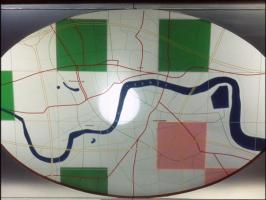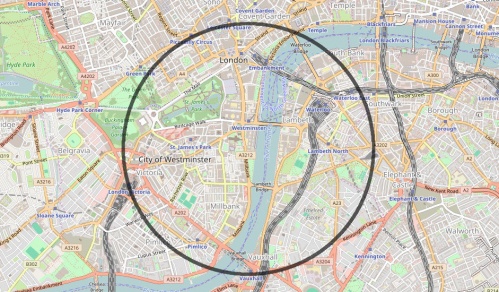Blog
2017-06-03
As a child, I was a huge fan of Captain Scarlet and the Mysterons, Gerry Anderson's puppet-starring sci-fi series.
As an adult, I am still a huge fan of Captain Scarlet and the Mysterons.
Set in 2068, the series follows Captain Scarlet and the other members of Spectrum as they attempt to protect Earth from the Mysterons.
One of my favourite episodes of the series is the third: Big Ben Strikes Again.
In this episode, the Mysterons threaten to destroy London. They do this by hijacking a vehicle carrying a nuclear device, and driving it to
a car park. In the car park, the driver of the vehicle wakes up and turns the radio on. Then something weird happens: Big Ben strikes thirteen!

The driver turning on the radio. Good to know that BBC Radio 4 will still broadcast at 92-95FM in 2068.
Following this, the driver is knocked out again and wakes up in a side road somewhere. After hearing his story, Captain Blue works out that
the car park must be 1500 yards away from Big Ben. Using this information, Captains Blue and Scarlet manage to track
down the nuclear device and save the day.
After rewatching the episode recently, I realised that it would be possible to recreate this scene and hear Big Ben striking thirteen.
Where does Big Ben strike thirteen?
At the end of the episode, Captain Blue explains to Captain Scarlet that the effect was due to light travelling faster than sound: as the
driver had the radio on, he could hear Ben's bongs both from the tower and through the radio. As radio waves travel faster than
sound, the bongs over the radio can be heard earlier than the sound waves travelling through the air.
Further from the tower, the gap between when the two bongs are heard
is longer; and at just the right distance, the second bong on the radio will be heard at the same time as the first bong from the tower.
This leads to the appearance of thirteen bongs: the first bong is just from the radio, the next eleven are both radio and from the tower, and
the final bong is only from the tower.
Big Ben's bongs are approximately 4.2s apart, sound travels at 343m/s, and light travels at 3×108m/s (this is so fast that it
could be assumed that the radio waves arrive instantly without changing the answer). Using these, we perform the following calculation:
$$\text{time difference} = \text{time for sound to arrive}-\text{time for light to arrive}$$
$$=\frac{\text{distance}}{\text{speed of sound}}-\frac{\text{distance}}{\text{speed of light}}$$
$$=\text{distance}\times\left(\frac1{\text{speed of sound}}-\frac1{\text{speed of light}}\right)$$
$$\text{distance}=\text{time difference}\div\left(\frac1{\text{speed of sound}}-\frac1{\text{speed of light}}\right)$$
$$=4.2\div\left(\frac1{343}-\frac1{3\times10^8}\right)$$
$$=1440\text{m}\text{ or }1574\text{ yards}$$
This is close to Captain Blue's calculation of 1500 yards (and to be fair to the Captain, he had to calculate it in his head in a few seconds).
Plotting a circle of this radius centred at Big Ben gives the points where it may be possible to hear 13 bongs.
Again, the makers of Captain Scarlet got this right: their circle shown earlier is a very similar size to this one.
To demonstrate that this does work (and with a little help from TD and her camera),
I made the following video yesterday near Vauxhall station. I recommend using earphones to watch it as the later bongs are quite faint.
(Click on one of these icons to react to this blog post)
You might also enjoy...
Comments
Comments in green were written by me. Comments in blue were not written by me.
2023-12-02
Very late to this but how excellent! My Gerry Andersen experiences were at the start of his output...I even watched Stingray in black and white.(anonymous)
Add a Comment






